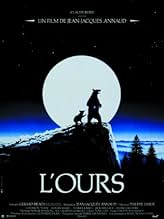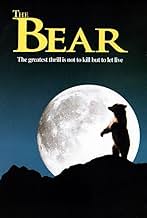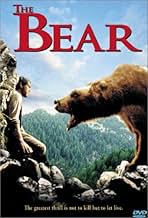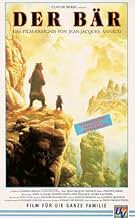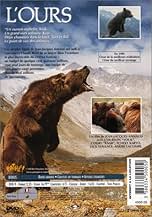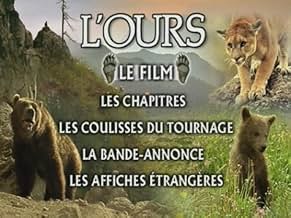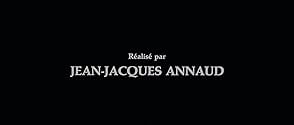CALIFICACIÓN DE IMDb
7.7/10
20 k
TU CALIFICACIÓN
Un cachorro de oso huérfano se une a un macho adulto mientras intentan esquivar a los cazadores humanos.Un cachorro de oso huérfano se une a un macho adulto mientras intentan esquivar a los cazadores humanos.Un cachorro de oso huérfano se une a un macho adulto mientras intentan esquivar a los cazadores humanos.
- Dirección
- Guionistas
- Elenco
- Nominado a 1 premio Óscar
- 5 premios ganados y 11 nominaciones en total
- Dirección
- Guionistas
- Todo el elenco y el equipo
- Producción, taquilla y más en IMDbPro
Opiniones destacadas
I have this on video but have not watched it for quite some time, the other night I watched it again and was of course entranced. The director has captured perfectly the life of the cub. If I have one gripe it is the use of a "human" voice for the emotions of the cub, in many scenes it is fairly obvious that it is a human being trying to express the emotions of the cub at the time. Secondly, while I understand the storyline of the hunters being integral to the film to be honest I felt that every scene with humans involved was boring beyond belief and I couldn't wait for it to be over. Overall this movie is a sheer joy to behold and the final scene where the cub finally goes to sleep without nightmares is pure bliss. You have to live with animals and know animals to realize how impressive this movie is and I firmly believe that the director has captured pure magic on film. Don't miss it.
We rarely see in our contemporary world simple, subtle films regarding nature which in turn give us a true essence of the meaning and beauty of life. All we absorb out of proportion day by day from watching television and films is the violence, vulnerability and sexual tendencies of the human being. The 60's and 70's were infested with the drugs and sex appeal trend and the 80's crammed more action macho flicks than one can count sheep. However, it was the 90's and the turn of the millennium that exploded into the CGI craze and destroyed the film industry, reducing it into a commercial quick-produce supermarket in which quality films came close to none-existent and where violence was more popular than ever before.
A rare example of subtle contemporary masterful film making is 'L'Ours', better known in English translation as 'The Bear'. Jean-Jacques Annaud, the man behind the most extraordinary of prehistoric based films, 'Quest For Fire', stunned the world with his unparalleled mesmerizing vision of a natural world destroyed by man in what virtually is a film without dialogue. Yet it is an experience that will play with your emotions and warm your heart, right up to the chilling finale.
The story is set around the 1800's and revolves around an orphaned bear cub and its struggle to survive the harsh wilderness of British Columbia following the death of its mother. Alone and with no survival skills, the bear cub must learn the necessities of life the hard way. That is until it meets a tough, lone, but wounded Grizzly bear whose endeavor to survive is all the same after mountain hunters, blinded by their hunger for wealth, pursue their valuable skins. The two Grizzlies form a bond more powerful than the guns that pursue them in which the cub learns all the hardships of life first hand and grows to stand up for itself against the vast, relentless world that it lives in. Does man, the pursuer, become one with nature and understand the value of life?
Very few films without dialogue have captured the imagination that 'The Bear' has inscribed in my memory. Following the film's conclusion, I made a pledge to myself that one day I will be going to British Columbia myself. The cinematography was excruciatingly beautiful - I felt like I was there throughout the whole duration of the picture. The music was so uplifting and poignant throughout, that it completely drained me of my emotions - especially the finale!
Tcheky Karyo (famous French actor) playing one of the hunting mountain men who comes to terms with nature, plays his role convincingly, but there was no better performance than that of the starring bear cub and its much larger assistant. Their commanding presence leaves us laughing, crying and despising. All were simply natural expressions and worked on a documentary level, giving this film immaculate credibility.
The subtlest of all films I have ever seen, I recommend this to anybody who likes the occasional escape from reality to a world where life makes all the more sense. A definitive addition in my collection and an escape I will be taking for years to come. A masterwork of epic proportions and a classic in its genre. May the film industry bestow upon us more of these pleasures in the near future!
A rare example of subtle contemporary masterful film making is 'L'Ours', better known in English translation as 'The Bear'. Jean-Jacques Annaud, the man behind the most extraordinary of prehistoric based films, 'Quest For Fire', stunned the world with his unparalleled mesmerizing vision of a natural world destroyed by man in what virtually is a film without dialogue. Yet it is an experience that will play with your emotions and warm your heart, right up to the chilling finale.
The story is set around the 1800's and revolves around an orphaned bear cub and its struggle to survive the harsh wilderness of British Columbia following the death of its mother. Alone and with no survival skills, the bear cub must learn the necessities of life the hard way. That is until it meets a tough, lone, but wounded Grizzly bear whose endeavor to survive is all the same after mountain hunters, blinded by their hunger for wealth, pursue their valuable skins. The two Grizzlies form a bond more powerful than the guns that pursue them in which the cub learns all the hardships of life first hand and grows to stand up for itself against the vast, relentless world that it lives in. Does man, the pursuer, become one with nature and understand the value of life?
Very few films without dialogue have captured the imagination that 'The Bear' has inscribed in my memory. Following the film's conclusion, I made a pledge to myself that one day I will be going to British Columbia myself. The cinematography was excruciatingly beautiful - I felt like I was there throughout the whole duration of the picture. The music was so uplifting and poignant throughout, that it completely drained me of my emotions - especially the finale!
Tcheky Karyo (famous French actor) playing one of the hunting mountain men who comes to terms with nature, plays his role convincingly, but there was no better performance than that of the starring bear cub and its much larger assistant. Their commanding presence leaves us laughing, crying and despising. All were simply natural expressions and worked on a documentary level, giving this film immaculate credibility.
The subtlest of all films I have ever seen, I recommend this to anybody who likes the occasional escape from reality to a world where life makes all the more sense. A definitive addition in my collection and an escape I will be taking for years to come. A masterwork of epic proportions and a classic in its genre. May the film industry bestow upon us more of these pleasures in the near future!
From the first moment when you see the little bear and his mom digging for honey I was entranced with this film. The whole aura of life in the wild- the mountain lions that prey on other animals and the bear is certainly an omnivore! I don't know how the filmmakers got all that great footage but I enjoyed seeing life through the eyes of the orphaned cub. The scenery is breathtaking. The hunters were almost an intrusion in the film, but in the end they helped to bring the story full circle. This film was recommened to me by a man who never reads, he waxed so about this film I had to see it and I agree it is both a nature film and an allegory on life.
A bear cub loses its mother while being fed. The orphan bear cub follows a huge male bear, being "adopted", protected and fed by the adult bear. Meanwhile, two hunters are following the big animal, which tries to evade in the mountainous forest. "The Bear" is a magnificent ecological fable, having the story developed through the eyes of the bears, which are indeed the "lead actors". I have read somewhere that it has been taken four years to Jean-Jacques Annaud prepare such a homage to the nature. Sometimes, the shooting recalls a National Geographic movie. Unfortunately the DVD released in Brazil does not have any information about the preparation of this movie. In the present days, it is hard to point out what computer makes, and what is real in a film, but it seems that the movie was shot using real trained animals. "The Bear" is another excellent work of the outstanding director Jean-Jacques Annaud and highly recommended as a perfect family entertainment and even to be presented for children in classrooms. My vote is nine.
Title (Brazil): "O Urso" ("The Bear")
Title (Brazil): "O Urso" ("The Bear")
The Bear was an art film veiled in the guise of a nature film. I never looked at the roving vistas and sharp cinematography, because when I first watched this, I was more concerned with the bear cub. This is certainly a minimalist film, but the execution was so well done, the power of the images speaks more than the occasional piece of dialogue that is spoken throughout the movie. While it can never be described as kids movie, I think kids might be interested in it due to the very National Geographic-like quality of the film (only without the voice overs). While it has been a long time since I last watched this film (about four years ago), the interesting imagery and the simple, yet meaningful story of survival will always stick with me.
¿Sabías que…?
- TriviaBecause in the wild, male bears usually eat bear cubs if they can, the filmmakers prepared the adult Bart the Bear for the cub by having him play with a teddy bear the size and fur color of the cub. When the trainers felt he was ready, he was introduced to the cub and he greeted the cub affectionately.
- ErroresAfter the bear attacks the hunters' horses, and one of the hunters has tracked down his hurt horse and has it cornered in a small rock enclosure, rocks are visible being thrown from the left side of the shot to stir the horse up.
- ConexionesFeatured in Motormouth: Episode #2.3 (1989)
- Bandas sonorasEnd Title Theme
Music adapted from "June: Barcarolle"
by Pyotr Ilyich Tchaikovsky (uncredited), from "The Seasons"
Played by Orchestra
Selecciones populares
Inicia sesión para calificar y agrega a la lista de videos para obtener recomendaciones personalizadas
- How long is The Bear?Con tecnología de Alexa
Detalles
Taquilla
- Total en EE. UU. y Canadá
- USD 31,753,898
- Fin de semana de estreno en EE. UU. y Canadá
- USD 3,676,530
- 29 oct 1989
- Total a nivel mundial
- USD 31,753,898
- Tiempo de ejecución1 hora 36 minutos
- Color
- Relación de aspecto
- 2.35 : 1
Contribuir a esta página
Sugiere una edición o agrega el contenido que falta


![Ver Bande-annonce [OV]](https://m.media-amazon.com/images/M/MV5BZTE0ODk2YTgtMWVkYy00YTRiLTllOTctODQwYjFlNTAwNTk4XkEyXkFqcGdeQXRyYW5zY29kZS13b3JrZmxvdw@@._V1_QL75_UX500_CR0)





